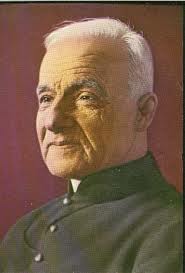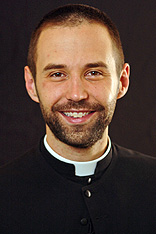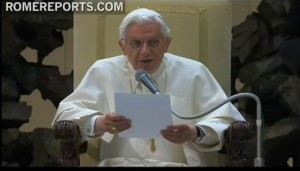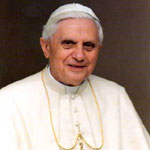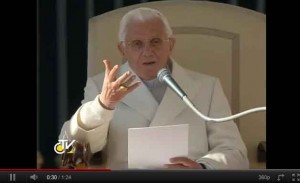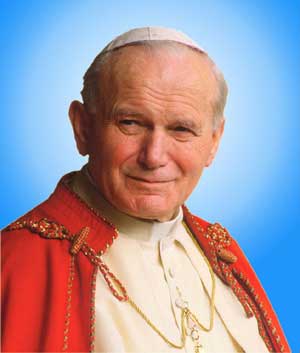Episode 2 – The School of Prayer: Reflections on the teachings of Pope Benedict XVI –  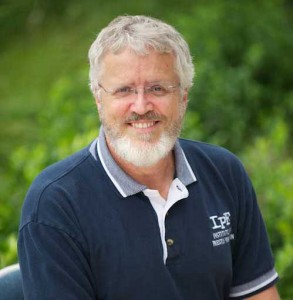 Faith and reason in the life of prayer.  Allowing God to effect our minds, as well as our hearts.  If you let God close you will be free…to let him in so close that God prays in you.  Letting God’s love be the norm of our culture…in the other and in the poor.  The role of silence in prayer and posture of kneeling.
Faith and reason in the life of prayer. Â Allowing God to effect our minds, as well as our hearts. Â If you let God close you will be free…to let him in so close that God prays in you. Â Letting God’s love be the norm of our culture…in the other and in the poor. Â The role of silence in prayer and posture of kneeling.
[powerpress]
Deacon James Keating, PhD, the director of Theological Formation for the Institute for Priestly Formation, located at Creighton University, in Omaha.
From  Pope Benedict’s 2nd audience on prayer:
A look at recent history reveals the failure of the predictions of those who, in the age of the Enlightenment, foretold the disappearance of religions and who exalted absolute reason, detached from faith, a reason that was to dispel the shadows of religious dogmatism and was to dissolve the “world of the sacredâ€, restoring to the human being freedom, dignity and autonomy from God. The experience of the past century, with the tragedy of the two World Wars, disrupted the progress that autonomous reason, man without God, seemed to have been able to guarantee.
The Catechism of the Catholic Church says: “In the act of creation, God calls every being from nothingness into existence…. Even after losing through his sin his likeness to God, man remains an image of his Creator, and retains the desire for the one who calls him into existence. All religions bear witness to man’s essential search for Godâ€Â (n. 2566). We could say — as I explained in my last Catecheses — that there has been no great civilization, from the most distant epoch to our day, which has not been religious.
For more information on the “Institute of Priestly Formation†and for other material available by Deacon Keating, just click here
Don’t forget to pickup a copy of “Communion with Christ†, it is one of the best audio sets on prayer…ever!
Check out Deacon Keating’s “Discerning Heart†page
Tags: catholic, catholic podcast, catholic prayer, cathollc spirituality, james keating, pope benedict, pope benedict xvi
This entry was posted on Thursday, January 19th, 2012 at 10:34 pm
You can follow any responses to this entry through the RSS 2.0 feed.
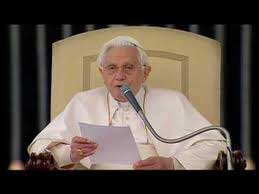 INVOKING THE GIFT OF UNITY AMONG CHRISTIANS
INVOKING THE GIFT OF UNITY AMONG CHRISTIANS
VATICAN CITY, 18 JAN 2012 (VIS) – The Week of Prayer for Christian Unity, which begins today, was the theme of Benedict XVI’s general audience celebrated this morning in the Paul VI Hall. The Holy Father explained how this initiative has been held annually for more than a century and brings together Christians from Churches and ecclesial communities, who “invoke that extraordinary gift for which the Lord Jesus prayed during the Last Supper: … ‘That they may all be one'”.
The Week of Prayer – established in 1908 by Paul Wattson, founder of an Anglican religious community who later entered the Catholic Church – “is one of the most effective annual expressions … of the impetus which Vatican Council II gave to the search for full union among all Christ’s disciples”, said the Pope. “This spiritual event, which unites Christians from all traditions, increases our awareness of the fact that the unity we strive for cannot result merely from our own efforts; rather, it is a gift we receive and must constantly invoke from on high”.
The texts for this year’s Week of Prayer have been prepared by a group of representatives from the Catholic Church, and from the Polish Ecumenical Council which proposed the theme of “We will all be changed by the victory of our Lord Jesus Christ”. The history of Poland – marked by defeats and victories, by the struggle to end oppression and achieve freedom – led the ecumenical group to reflect more deeply upon what it means to “win” and to “lose”.
In this context the Pope pointed out that, “in contrast to ‘victory’ understood in triumphal terms, Christ shows us a very different way. His victory does not involve power and might. … Christ speaks of victory through love, mutual assistance and boosting the self-esteem of those who are ‘last’, forgotten, excluded. For all Christians, the best expression of such humble service is Jesus Christ Himself, His total gift of self, the victory of His love over death. … We can share in this ‘victory’ only if we allow ourselves to be transformed by God”.
Likewise, “the unity for which we pray requires inner conversion, both shared and individual. But this must not be limited to cordiality and cooperation; we must reinforce our faith in God; … we must enter into the new life in Christ, Who is our true and definitive victory; we must open to one another, accepting all the elements of unity which God has conserved for us; … we must feel the pressing need to bear witness, before the men and women of our time, to the living God Who made Himself known in Christ”.
Tags: catholic, catholic podcast, catholic prayer, cathollc spirituality, christian unity, pope benedict xvi
This entry was posted on Wednesday, January 18th, 2012 at 8:50 am
You can follow any responses to this entry through the RSS 2.0 feed.
Episode 1 – The School of Prayer: Reflections on the teachings of Pope Benedict XVI –    “Life without prayer has no meaning or points of reference”.  The relationship between the Father and the Son and the Holy Spirit  is so essential to our understanding of prayer.  The meaning of the Church.  Suffering the coming of the Holy Spirit.  Jesus is the face of God.  Do not be afraid, He will teach you happiness.
 “Life without prayer has no meaning or points of reference”.  The relationship between the Father and the Son and the Holy Spirit  is so essential to our understanding of prayer.  The meaning of the Church.  Suffering the coming of the Holy Spirit.  Jesus is the face of God.  Do not be afraid, He will teach you happiness.
[powerpress]
Deacon James Keating, PhD, the director of Theological Formation for the Institute for Priestly Formation, located at Creighton University, in Omaha.
From  Pope Benedict’s 1st audience on prayer:
Human life is a fabric woven of good and of evil, of undeserved suffering and of joy and beauty that spontaneously and irresistibly impel us to ask God for that light and that inner strength which support us on earth and reveal a hope beyond the boundaries of death.
In the examples of prayer of the various cultures which we have considered, we can see a testimony of the religious dimension and of the desire for God engraved on the heart of every human being, which receives fulfilment and full expression in the Old and in the New Testament. The Revelation, is in fact purifying and brings to its fullness man’s original yearning for God, offering to him, in prayer, the possibility of a deeper relationship with the heavenly Father.
At the beginning of our journey in the “school of prayer†let us now ask the Lord to illumine our minds and hearts so that the relationship with him in prayer may be ever more intense, affectionate and constant. Once again, let us say to him: “Lord, teach us to pray†(Lk 11:1).
For more information on the “Institute of Priestly Formation†and for other material available by Deacon Keating, just click here
Don’t forget to pickup a copy of “Communion with Christ†, it is one of the best audio sets on prayer…ever!
Check out Deacon Keating’s “Discerning Heart†page
Tags: catholic, catholic podcast, catholic prayer, cathollc spirituality, james keating, pope benedict, pope benedict xvi
This entry was posted on Thursday, January 12th, 2012 at 11:11 am
You can follow any responses to this entry through the RSS 2.0 feed.
“Do not try to have your trials taken away from you, rather, ask for the grace to endure them wellâ€.
Pope Benedict XVI at St. Andre’s caniozation –
“Brother André Bessette, born in Quebec, in Canada, and a religious of the Congregation of the Holy Cross, knew suffering and poverty very early in life. This led him to turn to God for prayer and an intense interior life. Doorman at the Notre Dame College in Montreal, he showed boundless charity and did everything possible to soothe the despair of those who confided in him. With little instruction, he nevertheless understood what was essential to his faith. For him, to believe meant to submit freely and lovingly to Divine Will. Everything existed through the mystery of Jesus, he lived the beatitude of the pure of heart, that of personal rectitude. It is thanks to this simplicity, he showed many God. He had the Saint Joseph Oratory of Mont Royal built, where he was the faithful guardian until his death in 1937. There, he was the witness of many healings and conversions. “Do not try to have your trials taken away from youâ€, he said, “rather, ask for the grace to endure them wellâ€. For him, everything spoke of God and His presence. May we, following his example, search for God with simplicity to discover Him always present in the core of our lives! May the example of Brother André inspire Canadian Christian life!”
by Fr. Andrew Gawrych, CSC
Associate Director, US Office of Vocations
Notre Dame, IN
The Seven Crosses of St. Andre Bessette
Growing up, I feared that my life might be meaningless. In fact, it was the search for a truth and a love that could give my life eternal meaning that led me into the arms of Jesus and of the Church. Eventually, on March 29, 2010, I became a priest in the Congregation of Holy Cross – the same religious family of Brother André Bessette.One of the main lessons I have drawn from my saintly brother is that no life is meaningless in God. There were countless reasons why Brother André’s life should have ended up meaningless, and yet here we are celebrating his canonization. His life is the powerful story of how our crosses can be borne as a gift and transformed into our hope for true meaning and life. I invite you to join me in praying with this hero of our faith so that our lives, like his, might take on an eternal, life-giving meaning.
1. The Cross of Low Expectations
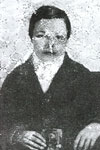 Brother André, the expectations for you couldn’t have been lower. They baptized you the day after your birth because they did not think you would survive. Later on, your physical frailty and lack of education made others expect so little of you, leaving for you only the more menial tasks like tending the door. Yet you fulfilled these simple tasks with such great love, exceeding the expectations of everyone. Intercede for us so that God may grant us the same courage to overcome our world’s paltry expectations of us. May we achieve the true greatness of holiness for which God lovingly created us.
Brother André, the expectations for you couldn’t have been lower. They baptized you the day after your birth because they did not think you would survive. Later on, your physical frailty and lack of education made others expect so little of you, leaving for you only the more menial tasks like tending the door. Yet you fulfilled these simple tasks with such great love, exceeding the expectations of everyone. Intercede for us so that God may grant us the same courage to overcome our world’s paltry expectations of us. May we achieve the true greatness of holiness for which God lovingly created us.
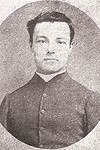 Brother André, you knew what it was like to wander through this life. While still young, you were orphaned and forced from your home. For many years, you journeyed from town to town and job to job, even leaving your homeland for the textile mills in the United States, in search of a new home. You only found your home in this life when Divine Providence led you to your vocation to the religious life in the Congregation of Holy Cross. Intercede for us that we may allow God to guide us towards the vocation to which we are called. May we, too, find our homes in this life.
Brother André, you knew what it was like to wander through this life. While still young, you were orphaned and forced from your home. For many years, you journeyed from town to town and job to job, even leaving your homeland for the textile mills in the United States, in search of a new home. You only found your home in this life when Divine Providence led you to your vocation to the religious life in the Congregation of Holy Cross. Intercede for us that we may allow God to guide us towards the vocation to which we are called. May we, too, find our homes in this life.
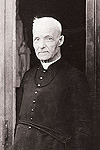 Brother André, you knew what it was like to be rejected. Your own religious family of Holy Cross did not accept you at first. You yourself said, “When I first arrived to the college, I was shown the door … and I remained there for forty years!â€Â Yet even more painfully, when the Lord chose you to be His healing hand in others’ lives, you incurred the misunderstanding and rejection of those who failed to see God’s greatness through you. Intercede for us, so that we may have the same strength in the face of ridicule. May we remain steadfast to the mission God has entrusted to us to bring Him glory.
Brother André, you knew what it was like to be rejected. Your own religious family of Holy Cross did not accept you at first. You yourself said, “When I first arrived to the college, I was shown the door … and I remained there for forty years!â€Â Yet even more painfully, when the Lord chose you to be His healing hand in others’ lives, you incurred the misunderstanding and rejection of those who failed to see God’s greatness through you. Intercede for us, so that we may have the same strength in the face of ridicule. May we remain steadfast to the mission God has entrusted to us to bring Him glory.
4. The Cross of Others’ Suffering
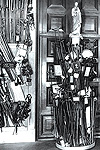 Brother André, you truly knew the weight of others’ suffering. As news of the healings spread, more and more people came to you, often expecting a miraculous cure. Their burdens became your burdens; their crosses became your crosses. Your ministry exacted its toll on you, draining your strength and patience and even bringing you to tears. You revealed to those suffering the hope of the Cross of Christ, the hope of the God who is always with us in our need. Intercede for us so that we may be able to enter into others’ sufferings and bear their crosses with them. May we unleash the healing hope of the Crucified One.
Brother André, you truly knew the weight of others’ suffering. As news of the healings spread, more and more people came to you, often expecting a miraculous cure. Their burdens became your burdens; their crosses became your crosses. Your ministry exacted its toll on you, draining your strength and patience and even bringing you to tears. You revealed to those suffering the hope of the Cross of Christ, the hope of the God who is always with us in our need. Intercede for us so that we may be able to enter into others’ sufferings and bear their crosses with them. May we unleash the healing hope of the Crucified One.
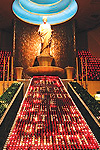 Brother André, even the works God accomplished through your life did not come without their setbacks. At many times during the construction of the Oratory dedicated to your patron St. Joseph, it seemed that the ambitious project would never be completed. Yet you continued to place your trust in Divine Providence. You even had a statue of St. Joseph placed under the unfinished roof so he could raise the remaining funds. And defying all predictions, St. Joseph did just that! Intercede for us so that we may have the same faith in Providence. May the setbacks of our life not distract us from fulfilling God’s will.
Brother André, even the works God accomplished through your life did not come without their setbacks. At many times during the construction of the Oratory dedicated to your patron St. Joseph, it seemed that the ambitious project would never be completed. Yet you continued to place your trust in Divine Providence. You even had a statue of St. Joseph placed under the unfinished roof so he could raise the remaining funds. And defying all predictions, St. Joseph did just that! Intercede for us so that we may have the same faith in Providence. May the setbacks of our life not distract us from fulfilling God’s will.
6. The Cross of Our Own Suffering
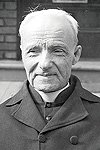 Brother André, from your birth and throughout your life, your health was frail. Rarely did you eat more than bread dipped in watered-down milk or soup. You knew physical suffering and its seeming meaninglessness that afflicted the many broken and ill people who came to you. But in God, your weakness became your strength, letting you enter more deeply into the hurts and pains of others. You journeyed in faith with them through the Cross to new life in Christ. Intercede for us so that we may be able to transform our weaknesses into strengths. May our sufferings be transformed into a redemptive balm in the lives of others.
Brother André, from your birth and throughout your life, your health was frail. Rarely did you eat more than bread dipped in watered-down milk or soup. You knew physical suffering and its seeming meaninglessness that afflicted the many broken and ill people who came to you. But in God, your weakness became your strength, letting you enter more deeply into the hurts and pains of others. You journeyed in faith with them through the Cross to new life in Christ. Intercede for us so that we may be able to transform our weaknesses into strengths. May our sufferings be transformed into a redemptive balm in the lives of others.
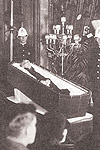 Brother André, like all of us since our ancestors Adam and Eve, you had to bear the ultimate cross of death. But death was not the end of your life or your life’s story. Battling the cold, over a million people came from far and wide to pay their last respects. Your funeral was just the preview of the millions who continue to visit the Oratory each year, as well as the many ministries to the poor and the sick that bear your name throughout the world. Intercede for us so that we, too, may have life in God and produce an even greater harvest for God’s people. May we, too, lay down our lives in such a way that we can be counted among the saints.
Brother André, like all of us since our ancestors Adam and Eve, you had to bear the ultimate cross of death. But death was not the end of your life or your life’s story. Battling the cold, over a million people came from far and wide to pay their last respects. Your funeral was just the preview of the millions who continue to visit the Oratory each year, as well as the many ministries to the poor and the sick that bear your name throughout the world. Intercede for us so that we, too, may have life in God and produce an even greater harvest for God’s people. May we, too, lay down our lives in such a way that we can be counted among the saints.
Tags: Andre Bessette, catholic, catholic podcast, catholic prayer, cathollc spirituality, congregation of holy cross, faith, holy cross, pope benedict xvi, saint joseph oratory, suffering, vocations
This entry was posted on Friday, January 6th, 2012 at 5:38 am
You can follow any responses to this entry through the RSS 2.0 feed.
VATICAN CITY, 28 DEC 2011 (VIS) – Prayer in the Holy Family of Nazareth was the theme of Benedict XVI’s catechesis during today’s general audience, which was held in the Paul VI Hall in the presence of 7,000 pilgrims.
“The house of Nazareth”, the Pope explained, “is a school of prayer where we learn to listen, to meditate, to penetrate the deepest meaning of the manifestation of the Son of God, drawing our example from Mary, Joseph and Jesus”.
“Mary is the peerless model for the contemplation of Christ”, he said. She “lived with her eyes on Christ and treasured His every word. … Luke the Evangelist makes Mary’s heart known to us, her faith, her hope, her obedience, her interior life and prayer, her free adherence to Christ. All of these came from the gift of the Holy Spirit, which descended upon her just as it descended upon the Apostles according to Christ’s promise. This image of Mary makes her a model for all believers”.
Mary’s capacity to live by the gaze of God is “contagious”, the Holy Father went on. “The first to experience this was St. Joseph. … With 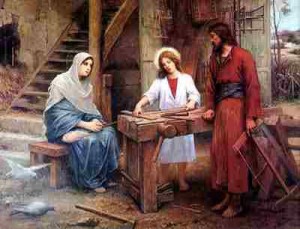 Mary, and later with Jesus, he began a new rapport with God, he began to accept Him into his life, to enter into His plan of salvation, to do His will”.
Mary, and later with Jesus, he began a new rapport with God, he began to accept Him into his life, to enter into His plan of salvation, to do His will”.
Although the Gospel has not preserved any of Joseph’s words, “his is a silent but faithful presence, constant and active. … Joseph fulfilled his paternal role in all aspects”. In this context, the Pope explained how Joseph had educated Jesus to pray, taking Him to the synagogue on Saturdays and guiding domestic prayer in the morning and evening. “Thus, in the rhythm of the days spent in Nazareth, between Joseph’s humble dwelling and his workshop, Jesus learned to alternate pray and work, also offering up to God the fatigue by which they earned the bread the family needed”.
Benedict XVI then turned his attention to the pilgrimage of Mary, Joseph and Jesus to the Temple in Jerusalem, as narrated in the Gospel of St. Luke. “The Jewish family, like the Christian family, prays in the intimacy of the home, but it also prays together in the community recognising itself as part of the pilgrim People of God”, he said.
Jesus’ first words – “Why were you searching for me? Did you not know that I must be in my Father’s house” – pronounced when Mary and Joseph found Him sitting among the teachers in the Temple, are a key to understanding Christian prayer. “From that moment, the life of the Holy Family became even richer in prayer, because the profound significance of the relationship with God the Father began to spread from the Heart of the boy (then adolescent, then young man) Jesus to the hearts of Mary and Joseph. The Family of Nazareth was the first model of the Church in which, in the presence of Jesus and thanks to His mediation, a filial rapport with God came to transform even interpersonal relations”.
“The Holy Family”, Benedict XVI concluded, “is an icon of the domestic Church, which is called to pray together. The family is the first school of prayer where, from their infancy, children learn to perceive God thanks to the teaching and example of their parents. An authentically Christian education cannot neglect the experience of prayer. If we do not learn to pray in the family, it will be difficult to fill this gap later. I would, then, like to invite people to rediscover the beauty of praying together as a family, following the school of the Holy Family of Nazareth”.
AG/VIS 20111228 (620)
Tags: catholic, catholic podcast, catholic prayer, cathollc spirituality, pope benedict xvi, prayer
This entry was posted on Sunday, January 1st, 2012 at 3:39 pm
You can follow any responses to this entry through the RSS 2.0 feed.
VATICAN CITY, 14 DEC 2011 (VIS) –
In his general audience this morning, the Holy Father dedicated his catechesis to Jesus’ prayer in the context of His healing miracles, focusing particularly on the healing of the deaf man as narrated in the Gospel of St. Mark, and the raising of Lazarus.
The healing of the deaf man “demonstrates that the cures worked by Jesus were connected with the intensity of His relationships, both with others and with the Father”, the Pope said. “With a gesture the Lord touches the sick man’s ears and tongue; that is, the sites of his infirmity. … But the central point of the episode lies in the fact that Jesus, at the very moment He works the cure, directly seeks
His relationship with the Father”, by looking up to heaven. “The narrative shows, then, that human involvement with the sick man led Jesus into prayer. His unique relationship with the Father emerges once again, His identity as Only-begotten Son. In Him, through His person, the healing and beneficial action of God is made present among us”.
The raising of Lazarus also highlights this aspect of Jesus’ dual relationships, His concern for a suffering friend and His filial bond with the Father. “His sincere affection for His friend … is expressed by the fact that Jesus was deeply moved at the sight of the suffering of Martha and Mary, and of all Lazarus’ friends, and in His profoundly human tears as he approaches the grave”, the Pope explained. At the same time, Christ interprets His friend’s death “in relation to His own identity and mission, and the glorification awaiting Him. When He hears news of Lazarus sickness, He says: ‘this illness does not lead to death: rather it is for God’s glory, so that the Son of God may be glorified through it'”.
“The moment when Jesus prays directly to the Father before the tomb is the natural climax of the entire episode”. According to John the Evangelist “Jesus looked upward and said, Father I thank you for having heard me”. This phrase, Benedict XVI explained, “shows us that Jesus had not for a moment ceased His prayer for Lazarus’ life. That prayer was continuous, indeed it strengthened Jesus’ bond with His friend and, at the same time, confirmed His decision to remain in communion with the will of the Father, with His plan of love in which the sickness and death of Lazarus is the place in which the glory of God is made manifest”.
Trusting in God’s will
These episodes, said the Holy Father, help us to understand “that when we ask the Lord for something in prayer, we must not expect an immediate fulfilment of our requests, of our will; rather, we should entrust outsides to the will of the Father, reading events in the perspective of His glory, of His plan of love which is often a mystery to our eyes. Thus in our prayer, request, praise and thanksgiving should fuse together, even when it seems to us that God does not respond to our expectations. Abandoning ourselves to the love of God, which always precedes and accompanies us, is a fundamental principle in our dialogue with Him. … Beyond anything that God may give us when we invoke Him, the greatest gift He can give us is His friendship, His presence, His love”. The
giver is more precious than the gift.
“The concern Jesus, true God and true man, feels for others, especially the needy and suffering, … causes Him to turn to the Father. … But the opposite is also true: communion with the Father, constant dialogue with Him, causes Jesus to be attentive to the real-life situations of man, to which He brings the consolation and love of God”.
This profound bond between love for God and love for others must, the Pope concluded, also be part of our own prayers, which “open the door to God, teaching us how to abandon our own selves in order to come close to others, especially in moments of trial, bringing them consolation, hope and light”.
At the end of his catechesis the Holy Father spoke in various languages to greet the more than 7,000 pilgrims gathered in the Paul VI Hall. He expressed his particular appreciation to the people who had contributed to the restoration of the sculpture of “The Resurrection” by Pericle Fazzini, which adorns the Hall. “Following a period of painstaking efforts”, he said, “today we have the joy of being able to admire this work of art and faith in all its original splendour”.
Speaking then in Spanish, Benedict XVI addressed a delegation from the Mexican state of Puebla, expressing the hope that, “with God’s help, I will soon be able to visit you in your country”.
Tags: catholic, catholic podcast, catholic prayer, cathollc spirituality, pope benedict xvi, prayer
This entry was posted on Wednesday, December 14th, 2011 at 7:42 am
You can follow any responses to this entry through the RSS 2.0 feed.
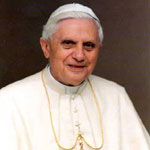 VATICAN CITY, 7 DEC 2911 (VIS) –
VATICAN CITY, 7 DEC 2911 (VIS) –
Benedict XVI dedicated the catechesis of today’s Wednesday audience, celebrated in the Vatican’s Paul VI Hall, to the Messianic Hymn of Jubilee, Jesus’ prayer of praise recorded in the Gospels of Matthew and Luke, which constitutes the “apex of a path of prayer in which Jesus’ profound and intimate communion with the Father in the Holy Spirit and His divine filiation clearly emerges “.
Already at the opening of the hymn, the Pope observed, Jesus addresses God by calling him Father, a term that expresses “Jesus’ awareness and certainty of being ‘the Son’ in close and constant communion with Him. This is the central point and the source of Jesus’ every prayer. … The name of ‘Father’ is followed by a second title: ‘Lord of heaven and earth'”, which “recalls the great biblical narration of the history of God’s love for human beings that began with creation. Jesus … is the pinnacle and the fullness of this history of love. … Through the expression ‘Lord of heaven and earth’ we also recognize how, in Jesus, the one who reveals the Father, the possibility of access to God is opened to humanity”.
But, to whom does the Son want to reveal the mysteries of God? “Divine revelation”, the pontiff explained, “does not occur within earthly logic, according to which humans are the wise and powerful who posses important knowledge and transmit it to those who are more simple. … God’s
style is another: His communication is addressed precisely to the ‘childlike’. … And what is this childlikeness that opens humans to a filial intimacy with God and to welcoming His will? … It is the pureness of heart that allows us to recognize the face of God in Jesus Christ. It is keeping our hearts as simple as those of children, without the presumptions of those who are locked in themselves, thinking they have no need of anyone, not even God”.
“In Matthew’s Gospel, after the Hymn of Jubilee, we encounter one of Jesus’ most moving pleas: ‘Come to me, all you who labor and are burdened, and I will give you rest.’ Jesus asks that we go to Him, the true wisdom, to the one who is ‘meek and humble of heart’; He proposes His ‘yoke’, the path of evangelical wisdom, which is neither a doctrine to learn nor an ethical proposal, but rather a Person to follow: He himself, the only-begotten Son, in perfect communion with the Father”.
“We also can address God with the confidence of sons and daughters”, Benedict XVI concluded, “calling Him Father when we pray. But we have to keep the heart of a child, the heart of those ‘poor in spirit’, in order to recognize that we are not self-sufficient … that we need God, that we have to seek Him, listen to Him, speak to Him. Prayer opens us to receiving the gift of God, His wisdom who is Jesus himself, in order to accept the will of the Father in our lives and to find consolation in the weariness of our journey”.
At the end of the audience, Benedict XVI greeted the pilgrims present in the hall in their various languages and noted that the Solemnity of the Immaculate Conception, which is celebrated tomorrow, “reminds us of Mary’s singular acceptance of God’s salvific plan. Preserved from any stain of sin in order to be the holy dwelling place of the Incarnate Word, she always trusted fully in the Lord”. The Pope especially urged the youth to make the effort to imitate the Virgin “with pure and clean hearts, letting yourselves be shaped by God who, in you as well, desires to bring about ‘great things'”.
Tags: catholic, catholic podcast, catholic prayer, cathollc spirituality, pope benedict xvi, prayer
This entry was posted on Wednesday, December 7th, 2011 at 9:13 am
You can follow any responses to this entry through the RSS 2.0 feed.
VATICAN CITY, 30 NOV 2011 (VIS) – This morning’s general audience was celebrated in the Paul VI Hall in the presence of 5,500 faithful. Having recently completed a series of catecheses dedicated to prayer in the Old Testament, the Pope today began a new cycle on the subject of the prayer of Christ which, he said, was “like a hidden canal irrigating His life, relationships and actions, and guiding Him with increasing firmness to the total gift of self, in keeping with the loving plan of God the Father”.
One particularly significant moment of prayer followed the Baptism of Jesus in the Jordan. This, the Pope noted, poses a query as to why Jesus, Who was without sin, should have chosen to submit Himself to John’s Baptism of penance and conversion. John the Baptist himself raised the question, saying “I need to be baptised by you, and do you come to me?”. The Holy Father explained how “by emerging Himself in the Jordan River, Jesus … expressed His solidarity with people who recognise their sins, who chose to repent and change their lives. He helps us to understand that being part of the people of God means entering into a new life, a life in conformity with God. By this gesture Jesus anticipated the cross, beginning His active life by taking the place of sinners, bearing the weight of the sin of all humankind on His shoulders”.
By praying after His Baptism, Jesus demonstrates His intimate bond with the Father, “experiencing His paternity and apprehending the demanding beauty of His love. Speaking to God, Jesus receives confirmation of His mission”, with the words that resound from on high: “This is my son, the Beloved” and with the descent of the Holy Spirit upon Him. “Through prayer”, the Pope said, “Jesus lives in uninterrupted contact with the Father in order to achieve His project of love for mankind”. It is in this profound union with the Father that Jesus made the move for the hidden life of Nazareth to His public ministry. (more…)
Tags: catholic, catholic podcast, catholic prayer, cathollc spirituality, pope benedict xvi, prayer
This entry was posted on Wednesday, November 30th, 2011 at 7:49 am
You can follow any responses to this entry through the RSS 2.0 feed.
November 19, 2011. (Romereports.com) The pope visited a shelter that welcomes dozens of abandoned children, some of whom are sick or malnourished. It’s called “Peace and Joy,†and it’s run by the Missionaries of Charity in Benin.
Cotonou’s Archbishop and the Mother Superior welcomed the pope, while children sang and danced for Benedict XVI.
Another 800 people, many of them children, waited for the pope in the nearby church of St. Rita. There, the pope talked about the day of his First Communion.
Benedict XVI
“The day of my First Communion was one of the most beautiful days of my life.â€He also said that during Communion, one should be ready to “receive Jesus with love and attention.â€
Talking to others about God is also key, said the pope. He described it as a treasure that should be used generously. The pope then explained to children how he prays.
Benedict XVI
“I can also use the Gospels. That way, I keep within my heart a passage which has touched me and which will guide me throughout the day.â€When it comes to praying, the pope asked them to pray as a family. He also called on children to encourage their parents to pray together as a unit.
Benedict XVI
“Ask your parents to pray with you! Sometimes you may even have to push them a little. But do not hesitate to do so. God is that important.!†ÂThe pope also explained what a rosary is and how to pray it.
At the end of the gathering, the pope gave a rosary to each one of the children.
During the pope’s international trips he usually sets time aside to meet with underprivileged children.
Tags: benedict xvi, catholic, catholic podcast, catholic prayer, cathollc spirituality, pope, pope benedict xvi
This entry was posted on Saturday, November 19th, 2011 at 8:11 pm
You can follow any responses to this entry through the RSS 2.0 feed.
VATICAN CITY, 16 NOV 2011 (VIS) – During today’s general audience in St Peter’s Square, attended by over 11,000 pilgrims, the Holy Father imparted the final catechesis of his cycle dedicated to the Psalms. He focused on Psalm 110, which “Jesus Himself cited, and which the authors of the New Testament referred to widely and interpreted in reference to the Messiah. … It is a Psalm beloved by the ancient Church and by believers of all times”, which celebrates “the victorious and glorified Messiah seated at the right hand of God”.The Psalm begins with a solemn declaration: “The Lord says to my lord: ‘Sit at my right hand until I make your enemies your footstool”. Benedict XVI explained that “Christ is the Lord enthroned, the Son of man seated at the right hand of God. … He is the true king who by resurrection entered into glory, … higher than the angels, seated in the heavens over all other powers, … and with all His adversaries at His feet until the last enemy, death, is definitively defeated by Him”.God and the king celebrated in the Psalm are inseparably linked. “The two govern together, to the point that the Psalmist confirms that God Himself grants the regal sceptre, giving the king the task of defeating his adversaries. … The exercise of power is a task the king receivesdirectly from the Lord, a responsibility which involves dependence and obedience, thus becoming a sign to the people of God’s powerful and provident presence. Dominion over enemies, glory and victory are gifts the king has received, that make him a mediator of divine triumph over evil”.The priestly dimension, linked to that of regality, appears in verse four. “The Lord has sworn and will not change his mind ‘You are a priest forever, according to the order of Melchizedek'”. This priest, the king of Salem, had blessed Abraham and offered bread and wine following the victorious military campaign conducted by the patriarch to save Lot from the hands of his enemies. The king of the Psalm “will be a priest forever, mediator of the divine presence among His people, a catalyst for the blessing of God”. Jesus Christ “is the true and definitive priest, Who will complete and perfect the features of Melchizedek’s priesthood”. In the bread and wine of the Eucharist, Christ “offers Himself and, defeating death, brings life to all believers”.The final verses portray “the triumphant sovereign who, with the support of the Lord, having received power and glory from Him, opposes his enemies, defeating adversaries and judging nations”. (more…)
Tags: catholic, catholic podcast, catholic prayer, cathollc spirituality, pope benedict xvi, prayer, psalm 110, psalms
This entry was posted on Wednesday, November 16th, 2011 at 1:25 pm
You can follow any responses to this entry through the RSS 2.0 feed.
From Vatican Radio – Pope Benedict XVI met with participants of the International Conference
“Adult Stem Cells: Science and the Future of Man and Cultureâ€, sponsored by the Pontifical Council for Culture. In his address, the Holy Father spoke about the “truly remarkable contributions†science can make to promoting and safeguarding human dignity. At the same time, he warned that scientists must be attentive to ethical concerns in pursuing their research, so that the inviolable dignity of each human being is never compromised.
[powerpress = “Vatican_Radio”]
Below is the full text of the Holy Father’s remarks:
Dear Brother Bishops,
Your Excellencies, Distinguished Guests,
Dear Friends,
I wish to thank Cardinal Gianfranco Ravasi, President of the Pontifical Council for Culture, for his kind words and for promoting this International Conference on Adult Stem Cells: Science and the Future of Man and Culture. I would also like to thank Archbishop Zygmunt Zimowski, President of the Pontifical Council for Pastoral Care of Health Workers, and Bishop Ignacio Carrasco de Paula, President of the Pontifical Academy for Life for their contribution to this particular endeavour. A special word of gratitude goes to the many benefactors whose support has made this event possible. In this regard, I would like to express the Holy See’s appreciation of all the work that is done, by various institutions, to promote cultural and formative initiatives aimed at supporting top-level scientific research on adult stem cells and exploring the cultural, ethical and anthropological implications of their use.Scientific research provides a unique opportunity to explore the wonder of the universe, the complexity of nature and the distinctive beauty of life, including human life. But since human beings are endowed with immortal souls and are created in the image and likeness of God, there are dimensions of human existence that lie beyond the limits of what the natural sciences are competent to determine. If these limits are transgressed, there is a serious risk that the unique dignity and inviolability of human life could be subordinated to purely utilitarian considerations. But if instead these limits are duly respected, science can make a truly remarkable contribution to promoting and safeguarding the dignity of man: indeed herein lies its true utility. Man, the agent of scientific research, will sometimes, in his biological nature, form the object of that research. Nevertheless, his transcendent dignity entitles him always to remain the ultimate beneficiary of scientific research and never to be reduced to its instrument.
Tags: adult stem cell research, catholic, catholic podcast, catholic prayer, cathollc spirituality, embroynic stem cell research, Pontifical Council for Culture, pope benedict, pope benedict xvi, science, scientific research, Vatican Radio From Vatican Radio
This entry was posted on Saturday, November 12th, 2011 at 7:56 am
You can follow any responses to this entry through the RSS 2.0 feed.
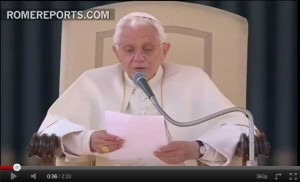 VATICAN CITY, 9 NOV 2011 (VIS) –
VATICAN CITY, 9 NOV 2011 (VIS) –
In his general audience this morning Benedict XVI focused his catechesis on Psalm 119, the longest of the Psalms, constructed as an acrostic in which each stanza begins with one of the twenty-two letters of the Hebrew alphabet. Its subject matter is “the Torah of the Lord; that is, His Law, a term which in its broadest and most complete definition comprehends teaching, instruction and life guidance. The Torah is revelation, it is the Word of God which is addressed to man and which arouses his response of faithful obedience and generous love”, the Pope said.
“The Psalmist’s faithfulness arises from listening to the Word, from keeping it in his heart, meditating upon it and loving it, like Mary who 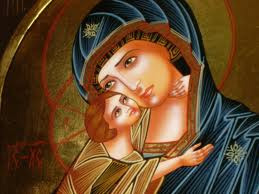 ‘treasured in her heart’ the words addressed to her, the marvellous events in which God revealed Himself and asked for her response of faith”, he explained. The Psalmist describes those who walk in the Law of the Lord as blessed, and indeed “Mary is blessed because she bore the Saviour in her womb, but above all because she accepted God’s annunciation and treasured His Word attentively and lovingly”.
‘treasured in her heart’ the words addressed to her, the marvellous events in which God revealed Himself and asked for her response of faith”, he explained. The Psalmist describes those who walk in the Law of the Lord as blessed, and indeed “Mary is blessed because she bore the Saviour in her womb, but above all because she accepted God’s annunciation and treasured His Word attentively and lovingly”.
Psalm 119 is constructed around this Word of life and blessing. Its central theme is the Word and the Law, and its verses are replete with synonyms thereof such as “precepts, decrees, promises”, associated with verbs such as “to know, to love, to meditate, to live”, the Holy Father explained. “The entire alphabet features in the twenty-two verses of the Psalm, as does the entire vocabulary of the believer’s relationship of trust with God. We find praise, thanksgiving and trust, but also supplication and lamentation; however, all of them are pervaded by the certainty of divine grace and the power of the Word of God. Even those verses most marked by suffering and darkness remain open to hope and are permeated with faith”.
The Law of God, which is “the centre of life”, must be “listened to with obedience but not servility, with filial trust and awareness. To listen to the Word is to have a personal encounter with the Lord of life. … The fulfilment of the Law is to follow Jesus”. Thus Psalm 119 “guides us towards the Gospel”, the Pope explained.
listen to the Word is to have a personal encounter with the Lord of life. … The fulfilment of the Law is to follow Jesus”. Thus Psalm 119 “guides us towards the Gospel”, the Pope explained.
In this context he focused particularly on verse 57: “The Lord is my portion; I promise to keep your words”.
“The term ‘portion'”, he explained, “evokes the partition of the Promised Land among the tribes of Israel, when the Levites were given no part of the territory because their ‘portion’ was the Lord Himself. … These verses are also important for us today, especially for priests, who are called to live from the Lord and from His Word alone, with no other guarantees, no other wealth, and having Him as their one source of true life. It is in this light that we can understand the free choice of celibacy for the Kingdom of heaven, which must be rediscovered in all its beauty and power.
“These verses are also important for the faithful, the People of God who belong only to Him”, the Pope added in conclusion. “They are called to experience the radical nature of the Gospel, to be witnesses of the life brought by Christ, the new and definitive ‘High Priest’ Who offered Himself in sacrifice for the salvation of the world. The Lord and His Word are our ‘land’ in which to live in communion and joy”.
Tags: catholic, catholic podcast, catholic prayer, cathollc spirituality, pope benedict xvi, psalm 119
This entry was posted on Wednesday, November 9th, 2011 at 12:24 pm
You can follow any responses to this entry through the RSS 2.0 feed.
During his Angelus on Tuesday, Pope Benedict said “the Feast of All Saints is a good time to lift our gaze from the realities of the world… to the enormity of God, who encompasses all eternity and holiness. “
He said holiness is the vocation of all the baptized, and all the people of God are called to be saints.
The Pope then turned his thoughts to Wednesday’s commemoration of All Souls
[powerpress = “Vatican Radio”]
“From the early days of the Christian faith,†he said, “the Church on earth, recognizing the communion of the whole mystical body of Jesus Christ, has with great respect honored the memory of the dead and offered prayers for them.â€The Pope said “our prayers for the dead are not only useful, but necessary.â€
The Holy Father reminded the faithful to keep the bonds of affection with our loved ones who have died, not only through prayer, but also through actions like visiting cemeteries.
He said this reminds us all that we are meant for another life after death.
see more on the website for Vatican Radio
Tags: all saints, catholic, catholic podcast, catholic prayer, cathollc spirituality, pope benedict xvi, prayer, purgatory, vatican radio
This entry was posted on Tuesday, November 1st, 2011 at 2:42 pm
You can follow any responses to this entry through the RSS 2.0 feed.
Here is Pope Benedict XVI’s homily for the Mass of beatification:
Dear Brothers and Sisters,
Six years ago we gathered in this Square to celebrate the funeral of Pope John Paul II. Our grief at his loss was deep, but even greater was our sense of an immense grace which embraced Rome and the whole world: a grace which was in some way the fruit of my beloved predecessor’s entire life, and especially of his witness in suffering. Even then we perceived the fragrance of his sanctity, and in any number of ways God’s People showed their veneration for him. For this reason, with all due respect for the Church’s canonical norms, I wanted his cause of beatification to move forward with reasonable haste. And now the longed-for day has come; it came quickly because this is what was pleasing to the Lord: John Paul II is blessed!….
Today is the Second Sunday of Easter, which Blessed John Paul II entitled Divine Mercy Sunday. The date was chosen for today’s celebration because, in God’s providence, my predecessor died on the vigil of this feast. Today is also the first day of May, Mary’s month, and the liturgical memorial of Saint Joseph the Worker. All these elements serve to enrich our prayer, they help us in our pilgrimage through time and space; but in heaven a very different celebration is taking place among the angels and saints! Even so, God is but one, and one too is Christ the Lord, who like a bridge joins earth to heaven. At this moment we feel closer than ever, sharing as it were in the liturgy of heaven.
….
Dear brothers and sisters, today our eyes behold, in the full spiritual light of the Risen Christ, the beloved and revered figure of John Paul II. Today his name is added to the host of those whom he proclaimed saints and blesseds during the almost twenty-seven years of his pontificate, thereby forcefully emphasizing the universal vocation to the heights of the Christian life, to holiness, taught by the conciliar Constitution on the Church Lumen Gentium. All of us, as members of the people of God – bishops, priests, deacons, laity, men and women religious – are making our pilgrim way to the heavenly homeland where the Virgin Mary has preceded us, associated as she was in a unique and perfect way to the mystery of Christ and the Church. Karol WojtyÅ‚a took part in the Second Vatican Council, first as an auxiliary Bishop and then as Archbishop of Kraków. He was fully aware that the Council’s decision to devote the last chapter of its Constitution on the Church to Mary meant that the Mother of the Redeemer is held up as an image and model of holiness for every Christian and for the entire Church. This was the theological vision which Blessed John Paul II discovered as a young man and subsequently maintained and deepened throughout his life. A vision which is expressed in the scriptural image of the crucified Christ with Mary, his Mother, at his side.This icon from the Gospel of John (19:25-27) was taken up in the episcopal and later the papal coat-of-
arms of Karol WojtyÅ‚a: a golden cross with the letter “M” on the lower right and the motto “Totus tuus”, drawn from the well-known words of Saint Louis Marie Grignion de Montfort in which Karol WojtyÅ‚a found a guiding light for his life: “Totus tuus ego sum et omnia mea tua sunt. Accipio te in mea omnia. Praebe mihi cor tuum, Maria – I belong entirely to you, and all that I have is yours. I take you for my all. O Mary, give me your heart” (Treatise on True Devotion to the Blessed Virgin, 266).
In his Testament, the new Blessed wrote: “When, on 16 October 1978, the Conclave of Cardinals chose John Paul II, the Primate of Poland, Cardinal Stefan WyszyÅ„ski, said to me: ‘The task of the new Pope will be to lead the Church into the Third Millennium'”. And the Pope added: “I would like once again to express my gratitude to the Holy Spirit for the great gift of the Second Vatican Council, to which, together with the whole Church – and especially with the whole episcopate – I feel indebted. I am convinced that it will long be granted to the new generations to draw from the treasures that this Council of the twentieth century has lavished upon us. As a Bishop who took part in the Council from the first to the last day, I desire to entrust this great patrimony to all who are and will be called in the future to put it into practice. For my part, I thank the Eternal Shepherd, who has enabled me to serve this very great cause in the course of all the years of my Pontificate”. And what is this “cause”? It is the same one that John Paul II presented during his first solemn Mass in Saint Peter’s Square in the unforgettable words: “Do not be afraid! Open, open wide the doors to Christ!”
What the newly-elected Pope asked of everyone, he was himself the first to do: society, culture, political and economic systems he opened up to Christ, turning back with the strength of a titan – a strength which came to him from God – a tide which appeared irreversible. By his witness of faith, love and apostolic courage, accompanied by great human charisma, this exemplary son of Poland helped believers throughout the world not to be afraid to be called Christian, to belong to the Church, to speak of the Gospel. In a word: he helped us not to fear the truth, because truth is the guarantee of liberty. To put it even more succinctly: he gave us the strength to believe in Christ, because Christ is Redemptor hominis, the Redeemer of man. This was the theme of his first encyclical, and the thread which runs though all the others.
When Karol WojtyÅ‚a ascended to the throne of Peter, he brought with him a deep understanding of the difference between Marxism and Christianity, based on their respective visions of man. This was his message: man is the way of the Church, and Christ is the way of man. With this message, which is the great legacy of the Second Vatican Council and of its “helmsman”, the Servant of God Pope Paul VI, John Paul II led the People of God across the threshold of the Third Millennium, which thanks to Christ he was able to call “the threshold of hope”. Throughout the long journey of preparation for the great Jubilee he directed Christianity once again to the future, the future of God, which transcends history while nonetheless directly affecting it. He rightly reclaimed for Christianity that impulse of hope which had in some sense faltered before Marxism and the ideology of progress. He restored to Christianity its true face as a religion of hope, to be lived in history in an “Advent” spirit, in a personal and communitarian existence directed to Christ, the fullness of humanity and the fulfillment of all our longings for justice and peace.
Finally, on a more personal note, I would like to thank God for the gift of having worked for many years with Blessed Pope
John Paul II. I had known him earlier and had esteemed him, but for twenty-three years, beginning in 1982 after he called me to Rome to be Prefect of the Congregation for the Doctrine of the Faith, I was at his side and came to revere him all the more. My own service was sustained by his spiritual depth and by the richness of his insights. His example of prayer continually impressed and edified me: he remained deeply united to God even amid the many demands of his ministry. Then too, there was his witness in suffering: the Lord gradually stripped him of everything, yet he remained ever a “rock”, as Christ desired. His profound humility, grounded in close union with Christ, enabled him to continue to lead the Church and to give to the world a message which became all the more eloquent as his physical strength declined. In this way he lived out in an extraordinary way the vocation of every priest and bishop to become completely one with Jesus, whom he daily receives and offers in the Church.
Blessed are you, beloved Pope John Paul II, because you believed! Continue, we implore you, to sustain from heaven the faith of God’s people. You often blessed us in this Square from the Apostolic Palace: Bless us, Holy Father! Amen.
Tags: catholic, catholic podcast, catholic prayer, cathollc spirituality, pope benedict xvi, pope john paul ii, Second Vatican Council, virgin mary
This entry was posted on Saturday, October 22nd, 2011 at 6:55 am
You can follow any responses to this entry through the RSS 2.0 feed.
VATICAN CITY, 19 OCT 2011 (VIS) –
Some 20,000 pilgrims attended Benedict XVI’s general audience, which was held this morning in St. Peter’s Square. Continuing a series of catecheses dedicated to the Psalms, the Holy Father focused his attention on Psalm 136, “a great hymn of praise which celebrates the Lord in the many and repeated manifestations of His goodness down human history”.
The Pope explained how, in Jewish tradition, this Psalm is sung at the end of the Passover supper, and therefore it was probably also pronounced by Jesus at the last Passover He celebrated with His disciples. The text enumerates God’s many interventions in favour of His people “and each proclamation of a salvific action by the Lord is answered by an antiphon reiterating the main cause for praise: God’s eternal love, a love which, according to the Hebrew term used, implies faithfulness, mercy, goodness, grace and tenderness”.
God is first presented as “He Who ‘does great wonders’, first among them that of the creation: heaven, earth and stars. … With the creation the Lord shows Himself in all His goodness and beauty. He commits Himself to life, revealing a desire for good whence all other salvific actions arise”.
The Psalm goes on to consider God’s manifestations in history, evoking the great moment when the Israelites were freed from slavery in Egypt. The forty years of wandering in the desert were “a decisive period for Israel which, allowing itself to be guided by the Lord, learned to live on faith, obedient and docile to the laws of God. Those were difficult years, marked by the harshness of life in the desert, but also a happy time of confidence and filial trust in the Lord”.
“The history of Israel has known exhilarating moments of joy, of fullness of life, of awareness of the presence of God and His salvation”, said the Pope. “But it has also been marked by episodes of sin, painful periods of darkness and profound affliction. Many were the adversaries from whom the Lord liberated His people”. The Psalm speaks of these events, in particular the Babylonian exile and the destruction of Jerusalem, “when it seemed that Israel had lost everything, even its own identity, even its trust in the Lord. However, God remembers, and frees. The salvation of Israel and of all mankind is bound to the Lord’s faithfulness, to His memory. While man forgets easily, God remains faithful: His memory is a precious casket containing that ‘love which endures forever’ about which our Psalm speaks”.
The Psalm concludes by reminding us that God feeds His creatures, “caring for life and giving
bread. … In the fullness of time the Son of God became man to give life, for the salvation of each one of us; and He continues to gives Himself as bread in the mystery of the Eucharist, so as to draw us into His covenant, which makes us children. So great is God’s merciful goodness, the sublimity of His ‘love which endures forever'”. In conclusion the Pope read a quote from the First Letter of St. John, advising the faithful to bear it in mind in their prayers: “See what love the Father has given us, that that we should be called children of God; and that is what we are”.
AG/ VIS 20111019 (560)Â
raise the Lord, for he is good: for his mercy endures for ever.
2 Praise the God of gods: for his mercy endures for ever.Â
3 Praise the Lord of lords: for his mercy endures for ever.Â
4Â Who alone does great wonders: for his mercy endures for ever.Â
5 Who made the heavens in understanding: for his mercy endures for ever.
6Â Who established the earth above the waters: for his mercy endures for ever.
 7 Who made the great lights: for his mercy endures for ever.Â
8Â The sun to rule the day: for his mercy endures for ever.Â
9Â The moon and the stars to rule the night: for his mercy endures for ever.Â
10 Who smote Egypt with their firstborn: for his mercy endures for ever.Â
11 Who brought out Israel from among them: for his mercy endures for ever.Â
12Â With a mighty hand and with a stretched out arm: for his mercy endures for ever.Â
13 Who divided the Red Sea into parts: for his mercy endures for ever.
14 And brought out Israel through the midst thereof: for his mercy endures for ever.Â
15 And overthrew Pharao and his host in the Red Sea: for his mercy endures for ever.Â
16 Who led his people through the desert: for his mercy endures for ever.Â
17Â Who smote great kings: for his mercy endures for ever.Â
18Â And slew strong kings: for his mercy endures for ever.Â
19 Sehon king of the Amorrhites: for his mercy endures for ever.Â
20Â And Og king of Basan: for his mercy endures for ever.Â
21Â And he gave their land for an inheritance: for his mercy endures for ever.Â
22 For an inheritance to his servant Israel: for his mercy endures for ever.Â
23Â For he was mindful of us in our affliction: for his mercy endures for ever.
24 And he redeemed us from our enemies: for his mercy endures for ever.Â
25Â Who gives food to all flesh: for his mercy endures for ever.Â
26 Give glory to the God of heaven: for his mercy endures for ever. Give glory to the Lord of lords: for his mercy endures for ever.
Tags: catholic, catholic podcast, catholic prayer, cathollc spirituality, Israel, pope benedict, pope benedict xvi, prayer, psalm 136
This entry was posted on Wednesday, October 19th, 2011 at 4:02 pm
You can follow any responses to this entry through the RSS 2.0 feed.



